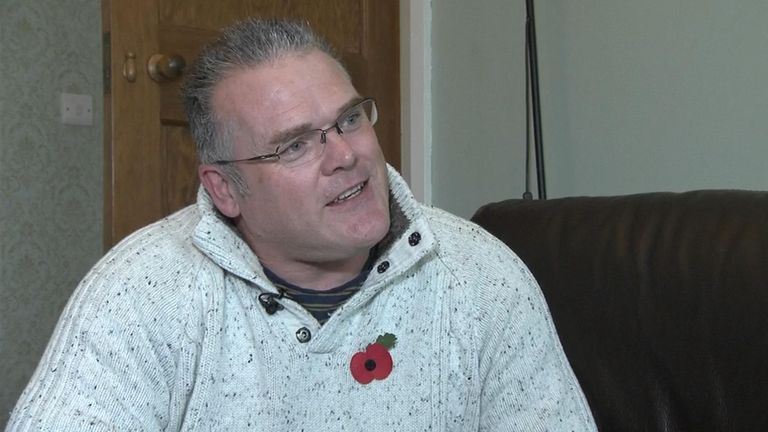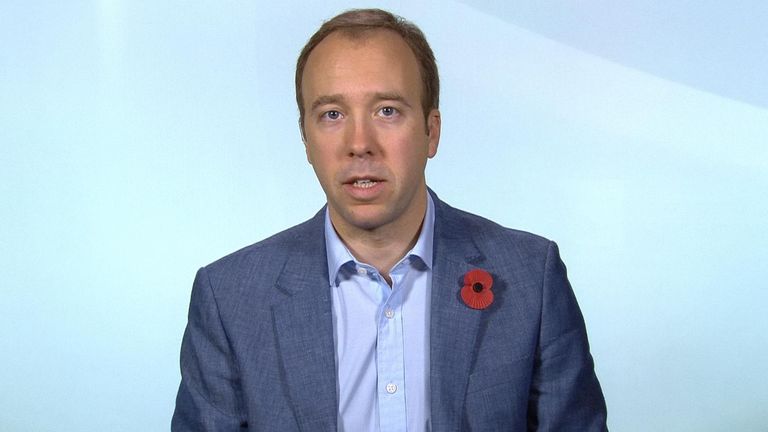HOW ARE THEY ABLE TO GET AWAY WITH THIS AWFUL TREATMENT OF THIS AUTISTIC GIRL? SHE'S NOT A CRIMINAL SHE IS AUTISTIC! THEY DID SIMILAR TO ME PUT ME IN A CELL IN 1972 AND I'M ALSO ASPERGER SYNDROME AND NOT A CRIMINAL. THEY WOULDN'T EVEN GIVE BETH ANY WATER TO DRINK 2 DAYS AGO! STOP IT, NOW,STOP TORTURING BETH, NOW!!!😠
Bethany: Health secretary sorry over care for locked-up autistic girl

The health secretary has apologised to an autistic girl who is locked up 24 hours a day without human contact.
Matt Hancock told Sky News that "the current plan" is to get Bethany - whose full name cannot be published - moved to a "more appropriate setting before Christmas".
Asked by Sky News' Sophy Ridge if he would say sorry to Bethany's father Jeremy, Mr Hancock said: "Of course I apologise to Jeremy, and frankly to Bethany, for the things that have gone wrong in her care."


Bethany was sectioned under the Mental Health Act when she was 15 because she was deemed a risk to herself and others. She has been locked up for almost three years.
Her distraught father has previously told Sky News that his daughter "is not an animal" after saying she is being held in a "cell" where food is served to her by sliding it across the floor.
Advertisement
Mr Hancock said: "I've met Jeremy and I insisted on a serious case review into Bethany's care, which I've received a couple of weeks ago - and in fact we've published the executive summary, which is very unusual because these things are highly sensitive and Bethany's case is incredibly difficult and complex.
"There are 10 recommendations in that review, which we are considering very carefully, essentially looking at how we can take those forward.
London Tube stations evacuated after dust cloud fills platforms
"Bethany does need to be moved and we're lining up where we can move her to, we've got to get that right.
"The current plan is for her to be moved to a more appropriate setting before Christmas, I very much hope that will happen."
In response, Jeremy was asked on Sky News if he was confident his daughter would be move this year. He replied: "No, but it has to happen now, because Matt has announced this on television.
"It's great to have the apology but without the actions that follow, that apology means nothing.
"I'm quite sure that Bethany will be aware [of Mr Hancock's comments] and Bethany will hang on every word that Matt Hancock has said, so I hope he has something up his sleeve."
Jeremy added: "To me, this is yet more promises, we've had three years of promises to do the right thing for Beth.
"We've had to take NHS England to court to get an apology, to get an acceptance that they are delaying her move back to the community."
Sponsored Links


11 comments:
I want to explain why I painted that picture of Beth with a unicorn. It's actually pretty disgraceful. I first heard about Bethany on Twitter, her dad Jeremy made a blog post about him being not allow to use a photo of his own daughter on his blog to try to stop the abusive way Beth is being treated by the authorities, because it's against her human rights! One as so angry when I heard that and offered to paint a picture of Beth so he could use that instead, because at least the abusive control freak wouldn't be able to force him to cover up the face of a painting!!! So that's why I painted it, with a unicorn because Beth loves animals. It makes me sad to see that photo with all her face blurred out. As an Asperger Syndrome person I feel like there are people in authority who would like to blot out us who don't fit into their neat little holes. It's absolutely not on and it's not ok.
Sorry for the typo, my tablet is jumping round all over the place.
Jeremy says they're allowing Beth to have water now. Thank God for that. I thought they'd put her on the Liverpool Care pathway. It's good that we are all trying to look out for one another. It makes me feel really sad that she's in a cell, it made me almost lose my mind when they did that to me in 1972.
Reposting this:
Stock Daily Dish
BUSINESS MARKET WATCH MOMENTUM STOCKS ABOUT US »
Nurse who for 12 years felt powerless to expose abuse of patients in the secure units speaks out
Posted by SDD Contributor on November 23, 2019 at 10:50 pm
Whistleblower nurse who lifted lid on autism abuse scandal reveals how she felt powerless for 12 years – until she saw one victim being so violently restrained by NHS staff they broke his NECK
A mental health nurse has revealed she saw staff in a secure psychiatric unit restrain a patient with learning disabilities so violently that they broke his neck – then left him lying in his own waste over a weekend.
The man was only taken to hospital two days later, after doctors intervened, and was found to be paralysed.
The senior team leader, who does not wish to be identified but I will call Elaine, says she was then asked to assist a cover-up at the hospital but refused and quit her job instead.
‘I had to leave because this incident and the aftermath went against everything I believe in,’ she told The Mail on Sunday. ‘These places are horrific, they are barbaric – we have created a system that is simply geared to abuse.’
The whistleblowing nurse, an expert in restraint techniques, stepped forward following our campaign to stop the routine locking up of teenagers and young adults with autism and learning disabilities. Last week, two other nurses and a senior carer blew the lid on what they called ‘shameful institutionalised abuse’ taking place behind the locked doors of a different institution, Meadow Lodge, a privately run unit in Devon funded by the NHS.
Ian Summers said he saw patients more often violently held down, attempt suicide and forcibly drugged while working in the unit holding vulnerable teenage girls than when he looked after killers and psychopaths at Broadmoor high-security hospital.
This newspaper has spoken to more than two dozen distraught families – some breaking gagging orders – who have told how their children have been taken from them for years and stuck inside unsuitable secure units that only lead to mental deterioration.
Much of their anger has been focused on private firms charging up to £730,000 a year for each patient – but the hideous story revealed by Elaine took place in an NHS psychiatric unit in the South of England six years ago.
The victim was a 36-year-old man with mild learning disabilities. ‘He was lovely if treated the right way,’ said Elaine, who is in her late 30s. ‘But there were four members of staff who did not like him, so they wound him up and he became abusive in response.’
She said the carers held him down before dumping him in a tiny seclusion cell. ‘Normally he would pace up and down in there but he lay on the floor in his own faeces and urine. They said he was putting it on and left him there for two days.
‘Only when the consultant came in was he sent to hospital, where they found his top two vertebrae were broken. He was in agony.’
The man was left paralysed for two years, eventually recovering some ability to walk with sticks after intensive therapy at another hospital. Elaine claimed she was then asked to cover up the incident by colleagues. ‘I was supposed to say it was an accident and there had been proper restraint methods used. I refused, so they made it impossible for me to work and I quit.’
She was relieved to leave a system she had joined full of idealism, inspired by an autistic godson and a relative who killed himself, but came to hate over 12 years working in secure units and ‘short-stay’ assessment and treatment units (ATUs).
The nurse said there was frequent abuse and bullying of patients – one man with Down’s syndrome who loved drawing would have his crayons hidden by staff to infuriate him – and regular over-medication to sedate people. ‘There is this view that staff are normal people and patients are not, which leads to institutional abuse across these ATUs and secure units.
‘It is difficult not to get sucked in and become part of the system. I have worked in more than ten of these places and I wouldn’t put my dog in one. They should be bombed.
‘Everything is locked, there is lots of seclusion and restraint when six adults push someone on the floor. It’s horrible.’
The use of restraint in ATUs has soared in recent years, rising from 15,065 incidents in 2016 to 22,620 in 2017. There is also growing concern over use of long stretches in solitary confinement, with patients held in padded cells under permanent observation. ‘If someone shows signs of challenging behaviour they are secluded, which is awful,’ said Elaine. ‘Imagine being placed in a room 6ft by 6ft with a plastic mattress and no access to a toilet unless a full restraint team accompanies you.
‘You are fed through a hatch, spoken to through a hatch. How does this help anyone?’
She said such units were especially grim for people with autism. ‘None of them is a nice environment for such people since they respond well to routine, comfort, the security of a family environment. So this noise and chaos, with alarms ringing and maybe ten people in a ward all demanding help, is never going to go well for them.’
Families have complained that this kind of incarceration is ‘a spiral of cruelty’ since innocent people are shut in conditions that only serve to intensify their anxieties and stresses, which then makes it harder for them to win freedom.
Yet this latest whistleblower, who now works to free patients, said families do not have a clue what really goes on behind locked doors.
‘I tell parents they should never seek help from the system because they will lose control of their child,’ Elaine said. ‘Ask for help and you risk losing your child.’
This is a terrifying indictment of our public services. Yet it is one I have heard echoed by despairing families, such as one distraught man who asked for three days’ respite help only to have his autistic son locked away for three years so far.
Elaine believes a broken system is being fuelled by big profits, with private groups expanding operations despite Government pledges to move people with autism and learning disabilities back into supported living in the community.
There are 2,375 people with autism and learning disabilities held in assessment and treatment units at a cost of about half a billion pounds a year, with the number of children more than doubling over the past three years, and scores more are held in other secure units. One man is thought to have cost taxpayers £10 million after being held against his family’s wishes for 18 years.
More than half the patients in ATUs have been detained for at least two years, and almost one in six for more than a decade. ‘It is all about money,’ said Elaine. ‘Why else do they keep people in these conditions, costing maybe £7,000 a week, when other mental health services are struggling and community facilities crumbling?’
Elaine, who has helped extricate 13 people over the past five years working as a care partner with local authorities, added: ‘I once thought I could save every autistic person in the United Kingdom – but sadly I am only able to help a handful.’
We trigger 4th autism inquiry
A major investigation into the abusive care of patients with autism is set to be launched by MPs – the fourth since The Mail on Sunday revealed how hundreds of teenagers and young adults are being locked up, forcibly drugged and violently restrained.
It is understood the Health and Social Care Select Committee, chaired by Conservative MP and former GP Sarah Wollaston, will examine the scandal and the floundering care system that leads to routine abuse and detention.
Westminster sources confirmed they were deciding on the scope of the investigation, which is likely to begin in the spring.
‘We are very keen to look hard at these issues,’ said one key figure.
Health Secretary Matt Hancock has already told the health watchdog the Care Quality Commission (CQC) to investigate after admitting that he was ‘deeply shocked’ by this newspaper’s revelations that children as young as 13 were being incarcerated in secretive secure units.
Distraught families have told how relatives with autism and learning disabilities are locked in solitary cells, fed through hatches like animals, and forcibly injected with drugs to sedate them.
One man has been held for 18 years, and 40 autistic patients have died in assessment and treatment units since 2015, often in abysmal conditions.
But a group of cross-party MPs last week accused Mr Hancock of ‘backtracking’ over such ‘inhumane detention’ in the Government’s new ten-year plan for the NHS.
The plan only commits the NHS to reducing the number of people with autism and learning disabilities in hospital units to less than half the 2015 levels by 2024, despite previous pledges to end such detention.
The MPs – including former Liberal Democrat Minister Norman Lamb, Labour’s Shadow Minister for Mental Health and Social Care Barbara Keeley, and Tories Johnny Mercer and Charles Walker – accused Mr Hancock of abandoning a target to cut numbers held by up to half by March this year.
The Health and Social Care Select Committee, chaired by Conservative MP and former GP Sarah Wollaston, will examine the scandal and the floundering care system that leads to routine abuse and detention of people with autism
‘Those held in institutions, who could live independent lives with support, have their human rights breached in an unacceptable way,’ the MPs said in a letter to the Health Secretary. ‘We know the use of force is endemic in many institutions, which is a further assault on their human rights. There is also grave concern over use of medication on patients.’
Mr Lamb, who organised the letter, said he was horrified that the Government was effectively encouraging the NHS to ‘take its foot off the pedal’ to end abuse.
Mr Walker, who has admitted to his own mental health issues, called on the Government to act quickly. ‘This has been overlooked for too long and we can’t let this suffering continue,’ he said.
Harriet Harman, chairman of the Joint Committee on Human Rights, which has already started its own investigation, has also written to Mr Hancock over ‘perverse incentives’ that lead to detention in ‘inappropriate’ institutions.
She demanded to know if private providers had a ‘vested interest’ in keeping autistic patients locked up, which can cost taxpayers £730,000 per person a year.
Ms Harman also asked if divisions between the NHS and local authorities stopped patients being freed. ‘This is not a good use of public money given that community care is often less expensive than inpatient care,’ she said. Her letter followed questioning by the committee last week of three senior NHS and CQC officials. ‘They just spouted gobbledegook and theory,’ said one infuriated MP.
The Mail on Sunday has also discovered that a report commissioned by the Department of Health and Social Care before the Winterbourne View scandal in 2011 – which revealed abuse in a privately run Gloucestershire care home – warned that the model of private provision, funded on debt, would frustrate efforts to free those being confined.
After the Government refused to publish the findings, it was released by a think-tank.
Rob Greig, former national director for learning disabilities, who co-wrote the report, said: ‘I was very disappointed that they [the Government] showed little interest in what we were saying.’
Over the past decade, the proportion of people with autism and learning disabilities in privately-run beds has soared from one-fifth to more than half as new players muscled in and opened secure units despite Government pledges to close them.
Children’s Commissioner Anne Longfield is also investigating the scandal.
Mr Handcock. What an unfortunate but also a very descriptive name he has.Perhaps I had best not say any more.
Post a Comment